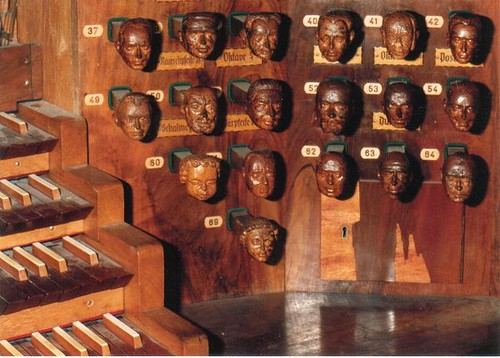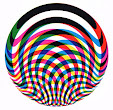Tuesday, February 17, 2009
Hans Henny Jahnn, Organ-Builder
Entry on Hans Henny Jahnn by Douglas E. Bush in The Organ: An Encyclopedia:
German scholar, author, philosopher, and organ-builder. Jahnn was a prolific poet, award-winning dramatist and novelist, and authority on organ building. He was born in Stellingen near Hamburg, 17 December 1894. His association with the organ began as early as 1913, and by 1916 (in Norway) he was intensely involved in organ studies. He was an outspoken critic of late-nineteenth-century organ building (although he accepted Aristide Cavaille-Coll's work with reservations), and he determined that the foundations of German organ building had disappeared and needed to be reestablished. In 1919 he and his friend, Gottlieb Harms, happened into Hamburg's Jacobi-Kirche and became acquainted with the Arp Schnitger organ in such bad state that the church had decided to remove and replace it. Jahnn began researching the instrument and convinced the authorities to let him restore the organ, a task he completed in 1923. This was the first major restoration of an historic organ and became a symbol and model for the Orgelbewegung (Organ Reform Movement).
Jahnn's work with the Schnitger organ had prompted studies of the pipework and led him to consider theories and perform experiments relative to what an organ should be. In 1925 in Hamburg, together with Gunther Ramin (future cantor at St. Thomas, Leipzig), he initiated the first congress of the Orgelbewegung (Orgeltagung Hamburg-Lubeck). The conference concerned itself with North German baroque organs. In 1927 he cofounded the German Council of Organists and directed some of its work between 1931 and 1933; he was also active as an organ consultant in Hamburg.
Between the years 1933 and 1945 Jahnn lived in political exile in Denmark and served as a consultant to the Theodor Frobenius firm in Copenhagen. Altogether, he consulted or designed the restoration or construction of over one hundred organs; several of the new organs incorporated Jahnn's ideas, such as the segregation of what he termed "masculine" and "feminine" stops. Examples of this include the Kemper organ at Hamburg, Heinrich-Hertz-Schule (now Lichtwarkschule), Hamburg (1931), and the Hammer organ at Langenhorn/Hamburg, Angarskirche (1931). In 1921, Jahnn cofounded Ugrino, a utopian religious community; in 1923 Ugrino established its own publishing house, devoted to the publication of early music. Jahnn became its owner in 1956. He died in Hamburg on 29 November 1959.
Subscribe to:
Post Comments (Atom)


















No comments:
Post a Comment